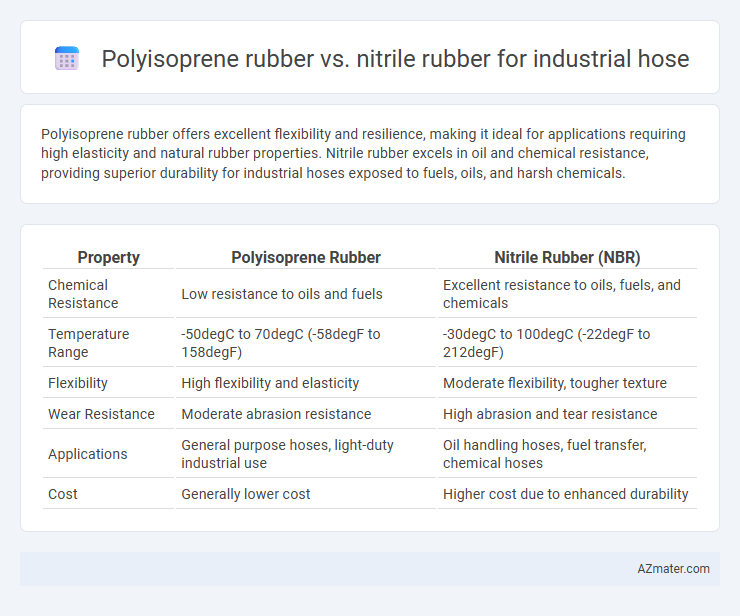Polyisoprene rubber offers excellent flexibility and resilience, making it ideal for applications requiring high elasticity and natural rubber properties. Nitrile rubber excels in oil and chemical resistance, providing superior durability for industrial hoses exposed to fuels, oils, and harsh chemicals.
Table of Comparison
| Property | Polyisoprene Rubber | Nitrile Rubber (NBR) |
|---|---|---|
| Chemical Resistance | Low resistance to oils and fuels | Excellent resistance to oils, fuels, and chemicals |
| Temperature Range | -50degC to 70degC (-58degF to 158degF) | -30degC to 100degC (-22degF to 212degF) |
| Flexibility | High flexibility and elasticity | Moderate flexibility, tougher texture |
| Wear Resistance | Moderate abrasion resistance | High abrasion and tear resistance |
| Applications | General purpose hoses, light-duty industrial use | Oil handling hoses, fuel transfer, chemical hoses |
| Cost | Generally lower cost | Higher cost due to enhanced durability |
Introduction to Polyisoprene and Nitrile Rubber
Polyisoprene rubber, a synthetic elastomer closely resembling natural rubber, offers excellent mechanical properties such as high tensile strength and flexibility, making it suitable for applications requiring resilience and durability. Nitrile rubber, known for its superior resistance to oils, fuels, and chemicals, provides enhanced durability in harsh industrial environments where exposure to hydrocarbons is common. Both materials are widely used in industrial hose manufacturing, with polyisoprene favored for flexibility and abrasion resistance, while nitrile excels in chemical and oil resistance.
Chemical Structure and Composition
Polyisoprene rubber is a natural polymer composed primarily of repeating isoprene units with a cis-1,4 configuration, providing excellent elasticity and tensile strength due to its crystalline structure. Nitrile rubber, or nitrile butadiene rubber (NBR), is a synthetic copolymer of acrylonitrile and butadiene, characterized by its polar nitrile groups that enhance resistance to oils, fuels, and chemicals. The chemical composition difference results in polyisoprene offering superior flexibility and resilience, while nitrile rubber excels in chemical resistance, making each suitable for distinct industrial hose applications depending on exposure requirements.
Mechanical Properties Comparison
Polyisoprene rubber exhibits excellent elasticity and tensile strength, making it highly resistant to abrasion and fatigue, which is ideal for dynamic industrial hose applications requiring flexibility and durability. Nitrile rubber offers superior resistance to oils, fuels, and chemicals, along with good tensile strength and abrasion resistance, making it suitable for hoses exposed to harsh chemical environments. The mechanical properties of polyisoprene emphasize elasticity and resilience, while nitrile prioritizes chemical resistance and mechanical robustness under aggressive conditions.
Resistance to Chemicals and Oils
Polyisoprene rubber exhibits moderate resistance to chemicals but is less effective against oils compared to nitrile rubber, which offers superior resistance to a broad range of hydrocarbons and petroleum-based oils, making it ideal for industrial hoses exposed to harsh chemical environments. Nitrile rubber's enhanced resistance to aliphatic oils, fuels, and greases ensures durability and longevity in demanding industrial applications, whereas polyisoprene's susceptibility to swelling and degradation limits its use in such conditions. Selecting nitrile rubber for industrial hoses ensures optimal performance where chemical and oil resistance is critical.
Temperature Performance Range
Polyisoprene rubber offers a temperature performance range typically between -50degC to 70degC, making it suitable for applications with moderate thermal exposure. Nitrile rubber stands out with a broader temperature resistance from -40degC to 120degC, providing superior durability in both high-temperature and abrasive conditions. Selecting nitrile rubber for industrial hoses enhances operational efficiency where elevated heat and chemical exposure are common.
Abrasion and Wear Resistance
Polyisoprene rubber offers moderate abrasion resistance and flexibility, making it suitable for applications requiring a balance between toughness and elasticity in industrial hoses. Nitrile rubber exhibits superior abrasion and wear resistance due to its high resistance to oils, fuels, and mechanical stress, enhancing hose durability in harsh industrial environments. Selecting nitrile rubber improves hose lifespan in abrasive conditions, while polyisoprene provides better flexibility but less resilience against wear.
Flexibility and Elasticity
Polyisoprene rubber offers superior flexibility and elasticity compared to nitrile rubber, making it ideal for industrial hoses requiring high resilience and stretchability. Nitrile rubber, while less flexible, provides better resistance to oils, fuels, and chemicals, balancing durability with moderate elasticity. Selection between polyisoprene and nitrile hinges on the specific industrial application demands for flexibility combined with chemical resistance.
Cost and Availability
Polyisoprene rubber generally offers moderate cost but has limited availability compared to nitrile rubber, which is widely produced and more cost-effective for large-scale industrial hose applications. Nitrile rubber demonstrates excellent resistance to oils and fuels, contributing to its higher demand and extensive market supply. Cost efficiency and availability make nitrile rubber the preferred choice in industries requiring durable and reliable hose materials.
Typical Industrial Applications
Polyisoprene rubber offers excellent flexibility and high tensile strength, making it ideal for industrial hoses used in food processing, pharmaceuticals, and medical applications due to its biocompatibility and resistance to abrasion. Nitrile rubber excels in oil, fuel, and chemical resistance, commonly utilized in automotive, petroleum, and industrial machinery environments where exposure to hydrocarbons and harsh chemicals is frequent. Both materials provide durability, but nitrile's superior resistance to oils and solvents makes it preferable for heavy-duty industrial hose applications involving aggressive fluids.
Choosing the Right Rubber for Your Industrial Hose
Polyisoprene rubber offers excellent elasticity and resilience, making it ideal for applications requiring flexibility and resistance to abrasion in industrial hoses. Nitrile rubber excels in oil, fuel, and chemical resistance, providing superior durability in harsh industrial environments. Selecting the right rubber depends on the operational conditions, such as exposure to oils or chemicals, temperature ranges, and mechanical stress to ensure optimal hose performance and longevity.

Infographic: Polyisoprene rubber vs Nitrile rubber for Industrial hose
 azmater.com
azmater.com